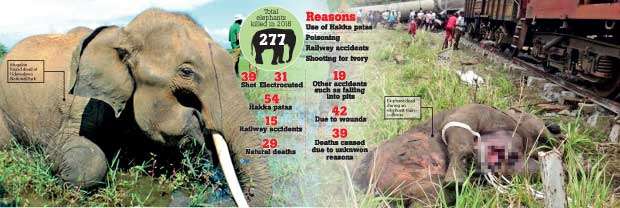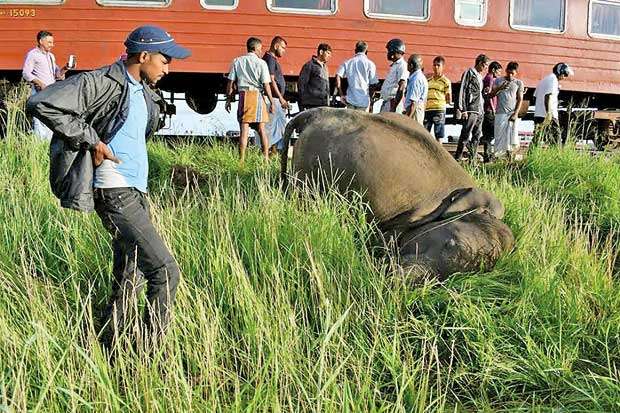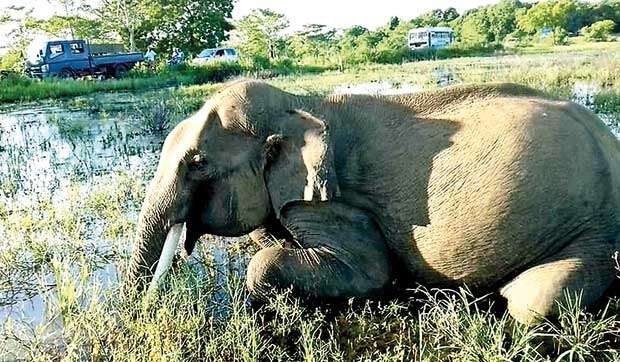27 Dec 2018 - {{hitsCtrl.values.hits}}

 Elephants, the once treasured beings of the wild, have become a threat to mankind as of today. History relates numerous instances when elephants were utilised to do work which couldn’t be performed by humans. In Hinduism, the elephant represents wisdom and Lord Ganesh is one of the most popular deities in the religion’s pantheon. Sri Lanka also includes a considerable number of its population that pay homage to Lord Ganesh. But the elephant in the wild isn’t on safe ground. During 2018, 277 elephants were found dead due to various reasons; most of which are related to humans. Issues such as the use of Hakka patas, poisoning, railway accidents and shooting for ivory remain unsolved. As the newly appointed Minister of Wildlife and Tourism recently resumed office, conservationists and officials at the Department of Wildlife Conservation (DWC) feel that there is still some hope of saving the rest of these majestic beings. As such the Daily Mirror takes a closer look at the number of elephants that bid farewell during this year and what could be done in future to save them.
Elephants, the once treasured beings of the wild, have become a threat to mankind as of today. History relates numerous instances when elephants were utilised to do work which couldn’t be performed by humans. In Hinduism, the elephant represents wisdom and Lord Ganesh is one of the most popular deities in the religion’s pantheon. Sri Lanka also includes a considerable number of its population that pay homage to Lord Ganesh. But the elephant in the wild isn’t on safe ground. During 2018, 277 elephants were found dead due to various reasons; most of which are related to humans. Issues such as the use of Hakka patas, poisoning, railway accidents and shooting for ivory remain unsolved. As the newly appointed Minister of Wildlife and Tourism recently resumed office, conservationists and officials at the Department of Wildlife Conservation (DWC) feel that there is still some hope of saving the rest of these majestic beings. As such the Daily Mirror takes a closer look at the number of elephants that bid farewell during this year and what could be done in future to save them.
Although these fences have been put up, they are not properly maintained. It is the duty of the Civil Defence Service to take care of maintenance
In September this year, a battle between two elephants at the Kalawewa reserve left one dead. Wildlife officials confirmed over 20 stabbings from a tusk which would have been the cause of death. The most intriguing part of this battle was to see a large number of elephants gathering around the corpse of the elephant in a gesture to pay their last respects to the leader of their herd.

The corpses of seven elephants were found in a swamp in Periyaaru, Polonnaruwa in early September. According to area residents, they would have walked from the Somawathiya Forest reserve in search of water. In Polonnaruwa alone, 51 elephants and 19 people have been killed due to the Human Elephant Conflict (HEC).

A number of elephants succumbed to their injuries after being hit by trains moving along the Colombo- Batticaloa railway line. Most deaths were reported from Habarana, Palugaswewa and Welikanda areas. An SMS alert service was recently introduced to minimise elephant-train accidents, but to what extent it has been successful is yet to be reported.

Mugalan, known to be the youngest tusker at the Udawalawa National Park, was shot dead during early December. The reason for its shooting is yet to be revealed as investigations are underway. However, environmentalists claim that it had a unique pair of tusks.
As one of the solutions to minimise elephant-train collisions, the Railway Department recently introduced an SMS alert service which notifies engine drivers about elephants romancing near railway tracks. A special operations centre will also be established to coordinate the messaging service.
“By the end of November, 277 elephant deaths have been reported,” said U. L Thaufeeq, Deputy Director - Elephant Conservation at the DWC. “Out of these, 39 have been shot, 31 elephants have been electrocuted, 54 of them were killed due to hakka patas, 15 were killed due to railway accidents, 19 from other accidents such as falling into pits, 29 natural deaths and 42 due to wounds that weren’t cured over a period of time. In addition to that, the postmortem reports haven’t been able to identify the cause of death of 39 other elephants. One death has also been reported as a result of poisoning. So far, investigations are underway to identify the suspects attached to Mugalan’s death. It was found dead within the Udawalawa National Park, but it may have been shot elsewhere.” said Thaufeeq.
When asked about the use of hakka patas by farmers to get rid of elephants, Thaufeeq further said that a bill has been circulated to spread awareness in areas where people have experienced these incidents frequently. “But people are not actively involved in reporting these incidents. We are also awaiting a final report on Dalaputtuwa’s death.” he said.
Some fences are bordering villages and there are issues when it comes to lands owned by the DWC. It takes time to solve these issues U. L Thaufeeq
Sri Lanka also witnessed an alarming increase in elephant deaths on railway tracks. Following this, several conservationists came forward with a proposal which was presented to the previous Minister of the Department of Wildlife and Conservation. “When this proposal was presented people criticised it and therefore we put up a notice calling for the public to present papers suggesting solutions regarding these elephant deaths. Tentatively we have introduced an SMS alert service along with the Railway Department.” he added.
Thaufeeq further said that there are land issues when it comes to erecting electric fences. “Some fences are bordering villages and there are issues when it comes to lands owned by the DWC. It takes time to solve these issues. Some fences which were scheduled to be put up during this year are yet to be installed due to these issues,” he said.
It has also been observed that most of these fences do not have electricity and elephants tend to uproot them and charge towards surrounding villages. In response to this issue, Thaufeeq said that although these fences have been put up, they are not properly maintained. It is the duty of the Civil Defence Service to look into the maintenance aspect of electric fences. We have discussed with the CDS and will provide a solution in the near future,” said Thaufeeq.
 “There are a number of solutions, but the problem lies in whether they are being implemented,” said Jayantha Jayawardene, a naturalist, elephant expert and Managing Trustee of The Biodiversity and Conservation Trust. “An SMS alert service has been introduced and engine drivers have been pre-warned, but these don’t really work. Sometimes these drivers are drunk. Solutions don’t really work until each issue is addressed individually. The DWC is conscious of working with conservationists, but they should choose people who are competent in providing solutions. Elephants walk through villages because their migratory routes may have been blocked or because they are restricted to pockets of jungles due to development activities in the surrounding areas,” explained Jayawardene.
“There are a number of solutions, but the problem lies in whether they are being implemented,” said Jayantha Jayawardene, a naturalist, elephant expert and Managing Trustee of The Biodiversity and Conservation Trust. “An SMS alert service has been introduced and engine drivers have been pre-warned, but these don’t really work. Sometimes these drivers are drunk. Solutions don’t really work until each issue is addressed individually. The DWC is conscious of working with conservationists, but they should choose people who are competent in providing solutions. Elephants walk through villages because their migratory routes may have been blocked or because they are restricted to pockets of jungles due to development activities in the surrounding areas,” explained Jayawardene.
When asked whether we are equipped with technology to address these issues Jayawardene pointed out that we have to first be equipped with a determined group of experts to solve this problem. “The DWC has to obey the orders of the Minister and now that the Minister has changed they have to do what he says. But I sincerely hope that the Minister would be able to get some advice from those who are competent in addressing elephant-related issues.” he affirmed.
An SMS alert service has been introduced and engine drivers have been pre-warned, but these don’t really work.Jayantha Jayawardene
 The Minister of the Department of Wildlife and Conservation is responsible for all matters related to wildlife. But with changing regimes and existing political issues ministers usually cannot complete their full terms in office. Even if they do so, they cannot solve all issues related to wildlife. Yet, much more needs to be fine-tuned in terms of efficiency and practicality in solving wildlife related issues. Just when the previous subject Minister Field Marshall Sarath Fonseka was trying to implement a few effective solutions, the political climate changed for the worse. But with a new Minister appointed, conservationists are harbouring hopes again.
The Minister of the Department of Wildlife and Conservation is responsible for all matters related to wildlife. But with changing regimes and existing political issues ministers usually cannot complete their full terms in office. Even if they do so, they cannot solve all issues related to wildlife. Yet, much more needs to be fine-tuned in terms of efficiency and practicality in solving wildlife related issues. Just when the previous subject Minister Field Marshall Sarath Fonseka was trying to implement a few effective solutions, the political climate changed for the worse. But with a new Minister appointed, conservationists are harbouring hopes again.
Speaking to the Daily Mirror, the newly appointed subject minister John Amaratunga said that he would meet all DWC officials and examine how much they have moved forward with existing projects.
I will meet all DWC officials and examine how much they have moved forward with existing projects John Amaratunga
30 Nov 2024 7 minute ago
30 Nov 2024 3 hours ago
30 Nov 2024 4 hours ago
30 Nov 2024 7 hours ago
30 Nov 2024 9 hours ago